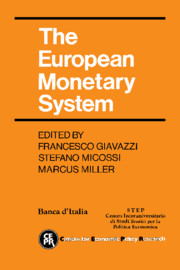Book contents
- Frontmatter
- Contents
- List of figures
- List of tables
- Preface
- Conference participants
- 1 Introduction
- I THE INTERNATIONAL ENVIRONMENT
- II DISINFLATION, EXTERNAL ADJUSTMENT AND COOPERATION
- 4 The role of the exchange-rate regime in a disinflation: empirical evidence on the European Monetary System
- 5 Inflation and the European Monetary System
- 6 Economic growth and exchange rates in the European Monetary System: their trade effects in a changing external environment
- III EXCHANGE RATES, CAPITAL MOBILITY AND MONETARY COORDINATION
- IV THE FUTURE OF THE EUROPEAN MONETARY SYSTEM
- Index
4 - The role of the exchange-rate regime in a disinflation: empirical evidence on the European Monetary System
Published online by Cambridge University Press: 12 March 2010
- Frontmatter
- Contents
- List of figures
- List of tables
- Preface
- Conference participants
- 1 Introduction
- I THE INTERNATIONAL ENVIRONMENT
- II DISINFLATION, EXTERNAL ADJUSTMENT AND COOPERATION
- 4 The role of the exchange-rate regime in a disinflation: empirical evidence on the European Monetary System
- 5 Inflation and the European Monetary System
- 6 Economic growth and exchange rates in the European Monetary System: their trade effects in a changing external environment
- III EXCHANGE RATES, CAPITAL MOBILITY AND MONETARY COORDINATION
- IV THE FUTURE OF THE EUROPEAN MONETARY SYSTEM
- Index
Summary
Introduction
Since the beginning of the 1980s, countries belonging to the European Monetary System (EMS) have experienced a large fall in inflation: Table 4.1 reports the evolution of inflation rates in Germany, France, Italy and Denmark, as well as – for the purpose of comparison – in the United Kingdom. This study illustrates what role the exchange-rate regime could have played in the disinflation, and empirically measures the effects predicted by the theoretical models.
The professional views about the role of the exchange-rate regime in a disinflation, as well as the actual experiences, differ widely. At one end of the spectrum, the negative experiences include the Southern-Cone ‘new style’ IMF plans where the exchange rate was used to stop very high inflation rates. These experiments were criticised, among others, by Dornbusch (1982): critics pointed to the disruptive effects of the large real exchange-rate appreciations, their ultimate unsustainability, and the lack of credibility of the exchange-rate targets. At the other end, Bruno (1986) suggests that the exchange-rate policy might have had an important role in the successful Israeli stabilisation. The positive role of the exchange-rate policy in the Bolivian stabilisation is also stressed by Sachs (1986).
In the case of the EMS experience, most observers tend to conclude that the exchange-rate regime helped the high-inflation economies. Fischer (1987) describes the EMS as ‘an arrangement for France and Italy to purchase a committment to low inflation by accepting German monetary policy’. Even in countries considering EMS membership the main advantages of membership are associated with Germany's reputation.
- Type
- Chapter
- Information
- The European Monetary System , pp. 85 - 111Publisher: Cambridge University PressPrint publication year: 1988
- 13
- Cited by



